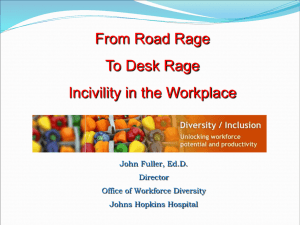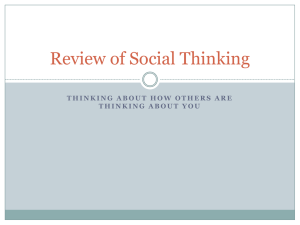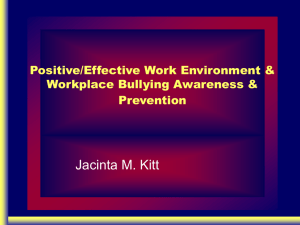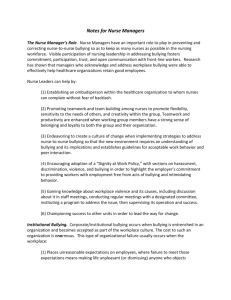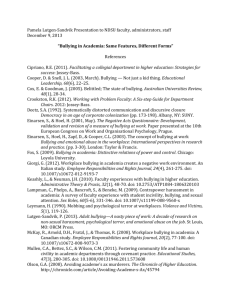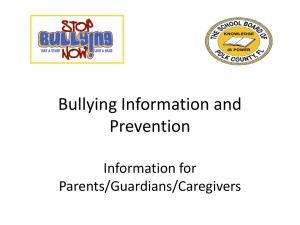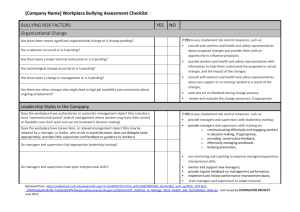Turning it Upside down-Relational Aggression
advertisement
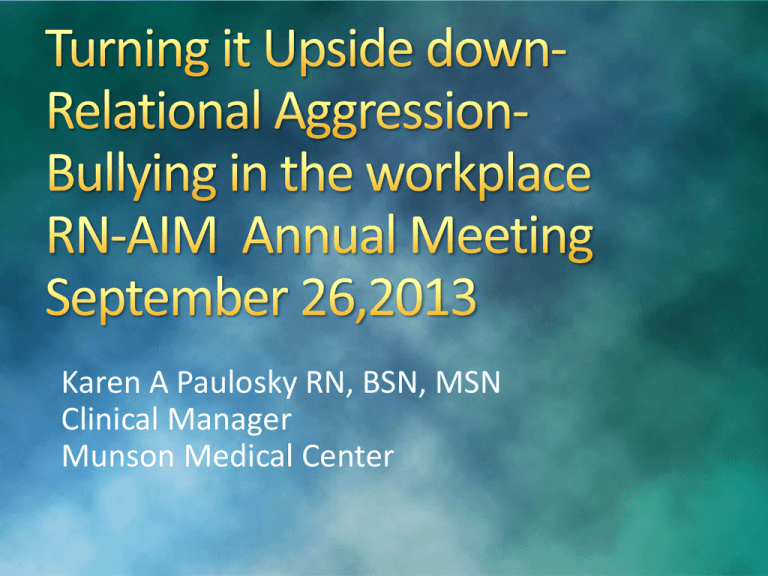
Karen A Paulosky RN, BSN, MSN Clinical Manager Munson Medical Center Differentiate between relational aggression (RA), workplace bullying (WPB) & incivility (IC). Evaluate the long term effects of being exposed to a “Chronic Mary” Explain the theme, “Why me? What have I done wrong?” Define the role of a “middler”. Explore employer’s response to claims of bullying in the workplace. Describe an Individual Action Develop an action plan for a given scenario Relational Aggression ( RA)Using words as weapons- hypercritical, depreciating or severe Linked to adverse physical and psychological outcomes Female bullying Work Place Bullying (WPB)Workplace Bullying Institute – “repeated healthharming, mistreatment of one or more persons (the targets) by one or more perpetrators.” Verbal, Offensive conduct/behaviors (including nonverbal)which are threatening, humiliating or intimidating Deliberate, Disrespectful and Repeated 3. Incivility- 3 parts Rude or discourteous speech or behavior that is disruptive, i.e. eye rolling, arm-crossing, walking away, bullying, taunting, intimidation. Joy stealing: Setting up, devaluing, misrepresenting, lying, shaming, breaking boundaries, splitting, mandating, blaming, silencing Resulting: Psychological or physiological distress Minor encounters can escalate into more threatening situations. 37% of US Workforce or 54 million Americans report repeated abusive behavior at work 41% say they have been psychologically harassed at work 50% of all workers have missed time from work because of harassing behavior directed at them 70-80% report recurring rudeness and incivility at work 82% of individuals targeted for workplace harassment leave their jobs Novice Nurse Studies*- Novice Nurse Productivity Following Workplace Bullying and Turnover of New Graduate Nurses in Their First Job Using Survival Analysis Link to increased intent to leave Poor Patient Outcomes Dissatisfaction with Interpersonal Relationships Negative affect on Novice Nurse Productivity and handling workload *Berry, P., Gillespie, G., Gates ,D. & Schafer, J. Journal of Nursing Scholarship , 2012,,44:1, 80-87 *Cho, S-H., Lee, J., Mark, B., Yun, S-C, Journal of Nursing Scholarship, 2012 44:1, 63-70. Sigma Theta Tau Pair up with a partner Share one example of relational aggression, bullying or incivility that you have seen or experienced in your career Toxic gossip Rumors Big HIM – humiliation, intimidation, and manipulative behaviors Increased stress, body weight, heart disease, accidents Increased cost of recruiting, onboarding and training Decreased production, motivation, morale, engagement, customer service, image, patient loyalty and referrals One word answer – nothing! What to do: Collecting and recording data 1. credible list – 4 or 5 behaviors 2. meet in neutral place Those who watch RA but don’t act OUCH Who are your friends? Caring and nurturing relational behaviors are more frequently observed. Ignore Circumvent the real problem Cost on morale, productivity, business, patient return and safety Individual who bears witness or is affected by RA/WPB/IS Emphasis on using assertive behavioral terms to address the disruptive behaviors File a report, met with supervisor or mediator Each person alternates detailing his or her view of the situation Adhere to civility rules Goal to find an interest-based resolution, clear expectations and agreement on who is doing what by when Seek common ground and pursue compromise Follow-up meeting to evaluate progress to resolve issue The individual displaying uncivil behaviors Emphasis for corrective actions will be placed on the behavior not the person Verbal warning Performance Improvement Plan (PIP) Education on financial, human, organizational costs that result from disruptive behavior and specific behavioral requirements ( i.e. self-control classes, stress management etc.) and associated time frames for improvement Individual- Data on RA/WPB person Peer-Commitment to My Co-Workers- Card from Relationship-based care CorporateEmployee Handbook, Polices and how you are supported if you are a target Nursing Transition to Practice Series I will accept responsibility for establishing and maintaining healthy interpersonal relationships with you and every other member of this team. I will talk with you promptly if I am having a problem with you. The only time I will discuss it with another person is when I need advise or help in deciding how to communicate with you appropriately. I will establish and maintain a relationship of functional trust with you and every other member of this team. My relationships with each of you will be equally respectful, regardless of job titles or levels of educational preparation. I will not engage in the “3B’s” ( Bickering, Back0biting, Blaming). I will practice the “3C’s” ( Caring, Committing, Collaborating) in my relationship with you and ask you do the same with me. I will not complain about another team member and ask you not to as well. If I hear you doing so, I will ask you to talk to that person. I will accept you as you are today, forgiving the past problems and ask you to do the same with me. I will be committed to finding solutions to problems rather than complaining about them or blaming someone for them, and ask you to do the same. I will affirm your contribution to the quality of our service. I will remember that neither of us is perfect, and that human errors are opportunities, not for shame or guilt but for forgiveness and growth. - Complied by Marie Manthey Review who will be the “target” and “bully” based on the previous discussed scenario Third person is the manager/facilitator and forth person is the observer Role play a meeting and then discuss the roles and how it played out Bully Free at Work- Valarie Cade Book and Free E course BullyFreeAtWork.com Crucial Conversation Tools- K Patterson, J Grenny, R McCMillan, A Switzler Toxic Nursing: Managing Bullying, Bad Attitudes and Total Turmoil Cheryl Dellasega & Rebecca L Volpe Sigma Theta Tau 2013 Creating & sustaining civility in nursing education Cynthia Clark Sigma Theta Tau 2013
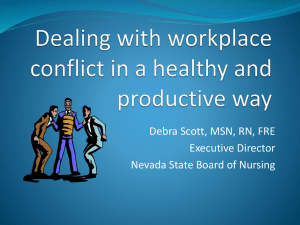
![04 Psychological wellbeing [MS Word Document, 123.0 KB]](http://s3.studylib.net/store/data/007278191_1-f429aaf4a36d7c754bb90ae765976ef6-300x300.png)

